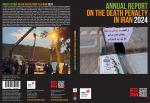 |
 |
| IRAN - IHR Annual Report 2024 |

|
IRAN - IHR 2024 Annual Report
February 20, 2025: February 20, 2025 - IRAN. Annual Report on the Death Penalty in Iran 2024
At least 975 people were executed in 2024, a 17% increase compared to 834 in 2023
The 17th Annual Report on the Death Penalty in Iran, by Iran Human Rights (IHR) and ECPM (Ensemble contre la peine de mort - Together Against the Death Penalty), provides an assessment and analysis of death penalty trends in 2024 in the Islamic Republic of Iran. It sets out the number of executions in 2024, the trend compared to previous years, the legislative framework and procedures, charges, geographic distribution and a monthly breakdown of executions. Lists of women and juvenile offenders executed in 2024 are also included in tables in the categories section.
The report also documents the abolitionist movement within Iran, including “No Death Penalty Tuesdays”, the forgiveness movement and its contribution to reducing the use of the death penalty, and provides analysis on how the international community can contribute to limiting the scope of the death penalty in Iran.
The 2024 report is the result of hard work from IHR members and supporters who took part in reporting, documenting, collecting, analysing and drafting its contents. We are especially grateful to IHR sources inside Iran who incur a significant risk by reporting on unannounced and secret executions in prisons of 30 different provinces. Due to the very difficult context, the lack of transparency and the obvious risks and limitations that human rights defenders face in the Islamic Republic of Iran, this report does not give a complete picture of the use of the death penalty in Iran. There are 39 reported executions which are not included in this report due to a lack of sufficient details or an inability to confirm cases through two different sources. However, the report aims to provide the most complete and realistic figures possible in the present circumstances.[1] It does not include suspicious deaths in custody, death row prisoners who died in prison before their executions or those killed under torture.
ECPM supports the elaboration, editing, publication and distribution of this report in the framework of its international advocacy work against the death penalty. To overcome the transparency issues surrounding data and information on the death penalty in Iran, a comprehensive strategy for distribution and dissemination is required. The overall objectives of IHR and ECPM in publishing this report are to call attention to and publicise the facts, with the aim of changing national and international views on the situation of the death penalty in Iran, the top executioner in the world per capita.[2]
2024 Annual Report at a glance
At least 975 people were executed in 2024, a 17% increase compared to 834 in 2023.
Only 95 executions (less than 10%) were announced by official sources compared to 15% in 2023, 12% in 2022, 16.5% in 2021 and an average of 33% in 2018-2020.
90% of all executions included in the 2024 report, i.e. 880 executions, were not announced by the authorities.
At least 503 people (51.6%) were executed for drug-related charges compared to 471 in 2023, 256 in 2022, 126 in 2021 and an average of 24 per year in 2018-2020.
Only 15 (3%) of the 503 drug-related executions were announced by official sources.
At least 419 executions (43% of all executions) were for murder charges.
2 protesters were among those executed for murder charges.
At least 31 people, amongst them 9 Kurdish political prisoners, and a political dissident abducted from a neighbouring country, were executed for security-related charges (moharebeh and efsad-fil-arz).
At least 22 people were executed for rape charges.
4 people were hanged in public spaces.
At least 1 juvenile offender was among those executed and cases of 3 possible others were still being investigated at the time of writing.
At least 31 women were executed, the highest number over at least 17 years.
At least 5 of those executed suffered from psychosocial and intellectual disabilities.
At least 80 Afghan nationals were executed in 2024, compared to 25 in 2023 and 16 in 2022.
At least 534 executions in 2024 and more than 5,075 executions since 2010 have been based on death sentences issued by the Revolutionary Courts.
At least 649 prisoners sentenced to death for murder charges were forgiven by the families of the murder victims per qisas laws.
The 17th Annual Report on the Death Penalty in Iran, published by Iran Human Rights (IHR) and Together Against the Death Penalty (ECPM), reveals a horrifying escalation in the use of the death penalty by the Islamic Republic in 2024. The year witnessed at least 975 executions, marking a 17% increase from the 834 recorded in 2023. This surge represents the highest number of recorded executions in Iran in more than two decades, with a particularly sharp rise observed after the presidential election and the appointment of Masoud Pezeshkian in the latter half of the year amidst escalating tensions between Iran and Israel.
Commenting on the report, Iran Human Rights Director, Mahmood Amiry-Moghaddam said: “While the world's attention was focused on escalating tensions between Iran and Israel, the Islamic Republic exploited the lack of international scrutiny to terrorise its own people, carrying out 5 to 6 executions every single day. Iranian people demanding their fundamental rights pose the greatest threat to the regime, and the death penalty remains its most powerful tool of political suppression. These executions are part of the Islamic Republic’s war against its own people to maintain its grip on power.”
Only 95 executions (less than 10%) were officially announced, a significant decline from the 15% disclosed in 2023. Despite repeated calls from the international community, this deliberate lack of transparency not only undermines accountability but also conceals the true scale of the state's use of the death penalty.
A significant portion of these executions were for drug-related offences, with at least 503 individuals put to death—a stark increase from previous years. These executions disproportionately affected marginalised communities, including ethnic minorities such as the Baluch. Despite this alarming trend, the United Nations Office on Drugs and Crime (UNODC) remained conspicuously silent, and continued its law enforcement cooperation with the Islamic Republic. This is despite the fact that in April, 84 human rights organisations, including IHR and ECPM, issued a global call urging the UNODC to suspend its law enforcement projects in Iran unless these executions are halted.
Commenting the continuation of the UNODC cooperation with Iran, amid the record high number of drug-related executions, Raphaël Chenuil-Hazan, the Executive Director of ECPM said: “The UNODC and the countries funding its law enforcement projects in Iran must understand their responsibility in the execution of hundreds of people every year for drug offences. By continuing this cooperation while the Islamic Republic carries out mass executions, they risk complicity in these crimes. The UNODC must immediately suspend its projects in Iran until all drug-related executions are halted. The implementation of a moratorium on the use of the death penalty for offenses that do not belong to the most serious crimes under international law should be a precondition to all cooperation.”
The year also saw the highest number of recorded qisas (retribution-in-kind) executions in more than two decades, with at least 419 individuals executed for murder charges. The brutal and inhumane qisas laws not only place the responsibility to choose execution on the shoulders of the murder victim’s family, but as there is no legal cap on diya (blood money), more and more defendants are being executed because they cannot afford the increasing sums. This is exemplified by cases such as Abbas Karimi, a father of two who was hanged because his family could not afford the diya of over one million euros. In another harrowing instance, Ahmad Alizadeh was hanged for 28 seconds, brought down and resuscitated upon the plaintiff's request, only to be executed again weeks later.
Iranian authorities continued their crackdown on political dissent, executing at least 10 individuals affiliated with banned opposition groups, including nine Kurdish political prisoners and a political prisoner and dual national abducted from a neighboring country. All of them were sentenced to death after sham trials by the Revolutionary Courts. Mohammad Ghobadlu and Reza Rasayi, two “Woman, Life, Freedom” protesters were executed for murder charges. Reza Rasayi, a Kurdish protester of Yarsan faith, was sentenced to death based on his torture-tainted confessions and elme-qazi (knowledge of the judge). Several “Woman, Life, Freedom” protesters remain at risk of the death penalty.
The execution of women reached a troubling milestone, with at least 31 women put to death—the highest number since IHR began monitoring executions in 2007. Discriminatory laws and societal factors contribute to the vulnerability of women in death penalty cases.
Two Kurdish women activists, Pakhshan Azizi and Varisheh Moradi, were sentenced to death and thanks to the popular campaigns and international pressure their sentences have not been implemented at the time of writing, but they remain in danger.
In 2024, as the only country in the world and in absolute violation of its international obligations, the Islamic Republic continued the execution of child offenders. At least one child offender was executed, with investigations ongoing into the cases of three others. It was also one of the few countries in the world to carry out public executions (four cases).
The Islamic Republic also intensified its targeting of Afghan nationals, along with discriminatory policies, executing at least 80 men, triple the number recorded the previous year. Iran Human Rights has also been able to document executions of people with psychosocial and intellectual disabilities. In 2024, at least five people including protester Mohammad Ghobadlu were executed, again in total contradiction with Iran’s international obligations.
In the face of this escalating brutality, both domestic and international opposition to the death penalty have grown. Inside Iran, prisoners initiated the “No Death Penalty Tuesdays” campaign, a protest movement that has garnered global support and lasted over a year.
Commenting on the “No Death Penalty Tuesdays” campaign, IHR Director Mahmood Amiry-Moghaddam stated, “The ‘No Death Penalty Tuesdays’ campaign is a turning point in Iran’s abolitionist movement. For the first time, a grassroots movement led by prisoners is protesting weekly against all executions, not just those of political prisoners. It marks the beginning of a broader social movement challenging the death penalty in its entirety. The people of Iran, human rights organisations, and the international community must support this movement."
The sharp rise in executions in 2024 highlights the Islamic Republic's deepening dependence on the death penalty to silence dissent and maintain control. With over 8,800 executions since 2010, the authorities persist in using the death penalty as a key instrument of oppression to preserve their grip on power.
In March 2025, at the 58th session of the United Nations Human Rights Council, the International Independent Fact-Finding Mission (FFMI) will present its final report on the atrocities committed by the Islamic Republic since the start of the “Woman, Life, Freedom” nationwide protests. The establishment of the FFMI by the UN Human Rights Council was a significant step by the international community to hold Iranian authorities accountable for the grave human rights violations, including the execution of protesters. Impunity and the lack of accountability are among the most important obstacles for improving the human rights situation in Iran. Given the scale of human rights violations in Iran, including the systematic use of the death penalty as a tool of repression, a more permanent international accountability mechanism will be essential in the coming years to hold the Islamic Republic responsible for its crimes.
On the occasion of publishing this report, IHR and ECPM call on the international community—including the UN Human Rights Council, UNODC, and governments with diplomatic relations with Iran—to put the death penalty on top of their agenda in their engagements with Iranian authorities. Consistent international pressure is essential to increasing the political cost of executions and curbing the Islamic Republic’s killing machine.
https://iranhr.net/en/articles/7350/ (Source: IHR)
|

